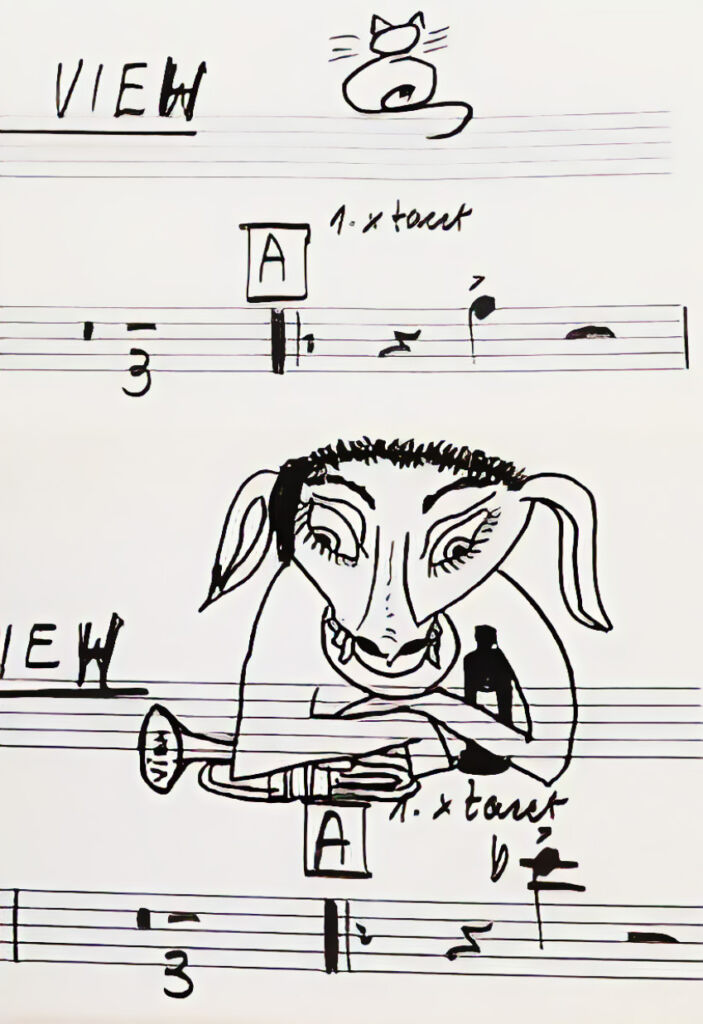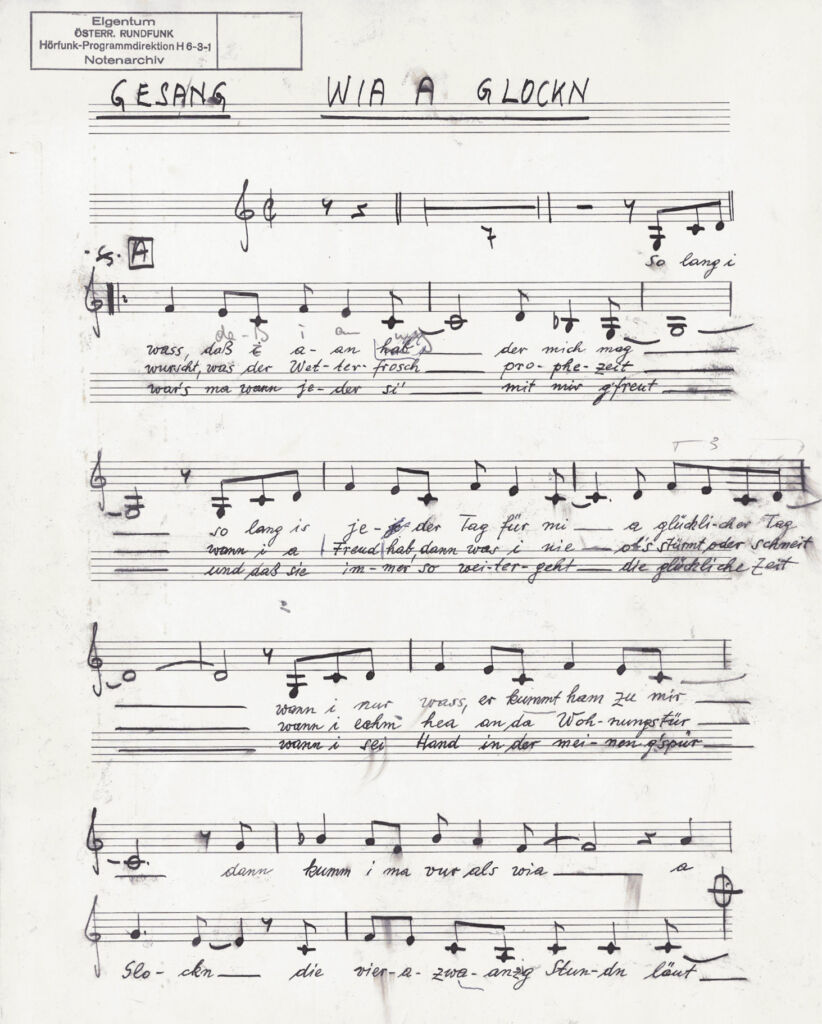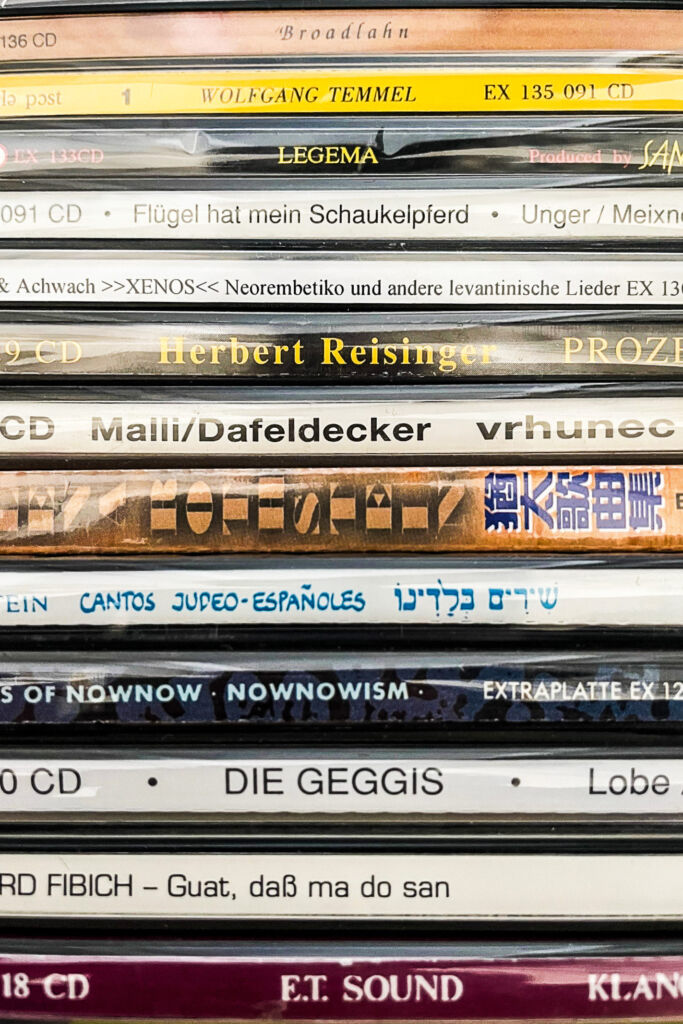In the recent practicum “Jazz in Austria”, taught by Magdalena Fürnkranz and Juri Giannini, an introduction to important holdings at Viennese libraries was paired with a focus on artistic legacies and collections at the archives and libraries of the mdw. Special attention was paid here to the history of the ORF Big Band, whose sheet music has been kept by the University Library since 2018.

Sheet Music, ORF Big Band
The 1971–1982 period, which witnessed the establishment and ultimate dissolution of ORF Radio’s own big band, can be viewed as an important decade for Austrian jazz. Under the leadership of Erich Kleinschuster, the ORF Big Band engaged internationally known greats like Art Farmer, Lee Harper, Jimmy Woode, and Wayne Darling. Some of these musicians also spent several years living in Vienna, which benefitted the Viennese jazz scene as a whole.
In a 2004 episode of the Ö1 radio show Jazztime Spezial, Klaus Schulz described the ORF Big Band and its area of work as follows: “It was to be a radio orchestra for all musical requirements—from providing music for TV quiz shows to accompanying stars from the Schlager genre to performing as a jazz orchestra. Erich Kleinschuster’s greatest love, though, was the jazz repertoire for big band.”1
The following poetic words of Robert Demmer, a composer who was also an ORF Big Band trumpeter, points out the impressive variety of personalities from the most diverse social backgrounds who came together there—united by their shared passion for their instruments: “(…), in short: everyone knows all that—as does, in any case, the orchestra, though it be a very colourful jumble, from Americans to socialists, from idiots to the intelligent, married to their instruments. (…)” 2
ORF Big Band drummer Fritz Ozmec, interviewed by the Graz-based jazz researcher Marcus Weberhofer, spoke about the stylistic versatility that was required: “Enormous variety. You had to be able to play in practically all styles at all times. (…) Particularly on drums. (…) Nowhere was that truer than with the drums. (…) And it really did take a whole lot of effort, because you had to be interested in everyone and everything—and you wanted to be, too.”3

The Artistic Legacy of Klaus Schulz
The artistic legacy of Klaus Schulz, part of the historical collection of the Department of Musicology and Performance Studies, is more than just an archive of materials from Schulz’s life and work; above all, it is an archive of Austrian jazz history. Klaus Schulz was a musicologist, author, radio journalist, and music manager, and over his nearly 60 years of passionate engagement with jazz music, he brought together an impressive collection of books, photographs, articles, letters, and newspaper clippings concerning some of Austria’s most important jazz musicians as well as jazz reception in Austria.
Schulz stood out for his great historical knowledge and personal connections in the jazz scene. With his articles on jazz bands and clubs and on the lives and activities of individual jazz musicians, he made a central contribution to the genesis of Austrian jazz historiography. A major focus of this archive is on holdings having to do with Hans Koller and Fatty George, both of whom were the subjects of biographies by Schulz. And from the belongings of Hans Koller, whom Schulz managed for a few years, there are personal treasures such as his private address book, which provides an impression of how Koller was networked with other jazz musicians.
This legacy still awaits closer inspection and contains a vast amount of material useful in researching the history of Austrian jazz. These holdings also include material concerning jazz phenomena that have received comparatively little attention thus far: one hits upon documents concerning the jazz club “Jazz bei Freddy”, founded in 1964, where groups like the Fritz Pauer Quartet recorded live records, as well as about the introduction of jazz music at the ORF in 1970 and about jazz scenes outside of Vienna from Graz to Linz and on to Bregenz.

Extraplatte: A Living Legacy
The company archive of the Viennese independent label Extraplatte is part of the historical collection of the Department of Musicology and Performance Studies and the Mediathek of the Department of Popular Music—and our practicum afforded us glimpses into both.
Extraplatte was an independent Austrian music label that also functioned as a production company, publisher, and distributor. Founded in 1977 and at first tied closely to the Viennese venue Folkclub Atlantis, it served lovers of non-mainstream music for 35 years. Harald Quendler took over the label two years after its founding and ran it until it ceased operations in 2013.
Quendler refers to Extraplatte as his life’s work, a project through which he could offer numerous Austria-based musicians their first opportunities to be produced as well as provide them with motivation and encouragement. Amidst the close collaboration between artists and the label, he functioned as a true “jack of all trades”—doing everything from recording to cover and booklet design and on to promotion, marketing, and distribution. Extraplatte’s repertoire ranged from contemporary concert music to the Neue Volksmusik [new folk music] genre, Austrian jazz, folk, and rock, and even Brazilian music, which—particularly in Vienna—experienced a surge in popularity during the 1990s.4 Extraplatte was a niche purveyor of innovative, idiosyncratic, and exotic output that augmented and indeed enriched the domestic music market, always with a focus that departed clearly from conventional mass-market interests. Quendler himself referred to his label’s offerings as “music off the charts”—being “from all musical and geographic regions but never such that our programme […] seemed arbitrary or random”5. However, consumer demand and the Austrian market ultimately proved too small—for which reason the company and its record store, which was located at Währinger Straße 46, went bankrupt in 2013. Over its 35 years of existence, Extraplatte most certainly did number among Austria’s most important platforms for new releases—especially within the singer-songwriter scene, jazz, and so-called “world music”.
At first glance, jazz in Austria may seem like a niche phenomenon—but our journey of discovery through the archives and our intense study of the ORF Big Band showed us that it was and still is a central component of this country’s cultural identity. Austria’s lively jazz scene of the 1970s and ’80s has by no means been fully researched, and our seminar paved the way for deeper engagement with this important era.
Listening tips:
- Stefanie & the ORF Big Band – Compared To What. Record Shack – RS.45-066DJS
- Vienna Art Orchestra – Jessas Na! Extraplatte – EXS15
- Hans Koller Quartet – Multiple Koller. L+R Records – CDLR 71026; Bellaphon – CDLR 71026. Liner notes: Klaus Schulz
Text: Elena Faderl, Matthäus Gabriel Huisbauer, Viktoria Oberndorfer
- Klaus Schulz: Typescript of “80 Jahre Radio in Österreich”, episode 5 of the radio programme Jazztime Spezial, 2004 (IMI, Historical Collection, Legacy of Klaus Schulz).
- Demmer, 1975 from the family archive Demmer, Vienna
- Fritz Ozmec in an unpublished interview with Marcus Weberhofer (2023)
- Neuhauser, Michael. “Extrafeine Extraplatten”, episode of the radio programme Spielräume Spezial. Ö1. oe1.orf.at/programm/20240728/763995/Extrafeine-Extraplatten (accessed on 28 Feb. 2025).
- Lohberger, Paul. “30 Jahre Extraplatte.” Skug. skug.at/30-jahre-extraplatte (accessed on 28 Feb. 2025).
